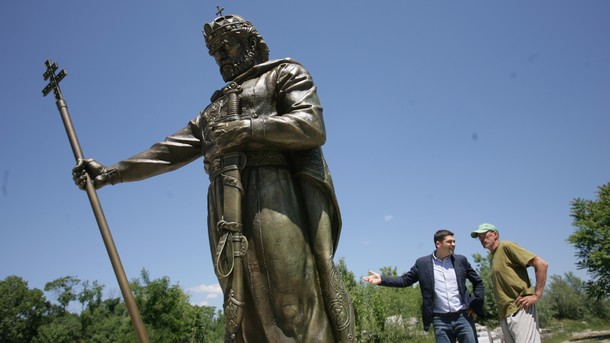
Today, in the center of Sofia, close to St. Sophia Church, a monument was unveiled to Bulgarian Tsar Samuil /997-1014/ on the occasion of the 1000th death anniversary of the great sovereign. He led the Bulgarian state in times of great trouble when the country was engaged in a long, dramatic and unequal warfare with the Byzantine Empire.
Why is Tsar Samuil worthy of a monument in the center of Sofia? Here are the arguments of historian Prof. Plamen Pavlov:
„His contemporaries described him as matchlessly strong, matchlessly brave. An author from 13 c. wrote about him the following: 'the notorious Samuil whom Bulgarians still remember'. At that time there was a cult for the tsar among Bulgarians and he was perceived as a national hero. Famous historians such as Steven Ranciman and Konstantin Jireček compared him to Bulgarian Tsar Simeon the Great /893-927/, not to mention local historians. To sum up: Samuil's place in Bulgarian history is quite important.”
The reign of Tsar Samuil became tragic when 15,000 Bulgarian soldiers held hostage by the Byzantine army were blinded. One in a hundred of them was left one-eyed to lead back home the rest. The sight of the blinded warriors killed the tsar who suffered a stroke. According to Prof. Plamen Pavlov, the attitude to Tsar Samuil and the blinded soldiers is part of the Bulgarian national identity. There is a further reason to dedicate a monument to Tsar Samuil in Sofia:
„We know that Tsar Samuil and his brothers, the Cometopuli, the sons of Comita (Governor) Nikola, came from an aristocratic family related to the dynasty of 9 c. Khan Krum. So, Samuil's ancestry was both ancient and royal. Comita Nikola was governor of Sredets, present-day Sofia. So it is quite possible that Samuil's birthplace was exactly Sofia. On the other hand, the St. Sophia Basilica, the ancient church that has lent its name to the city and is one of the major Christian churches in the Balkans, is intimately linked to Samuil. It is known that in 992 the relics of St. Ivan of Rila were moved from Rila Monastery to St. Sophia. This was most probably the work of the patriarch and of Samuil himself. So, there is indeed a good reason to install his monument in Sofia, close to the Christian shrine of St. Sophia.”
The monument was created by prominent sculptor Alexander Haytov who worked with designers Rosen and Maria Gurkov. Financing for the project has been raised by Bulgarian Memory Foundation chaired by Dr Milen Vrabevski, a businessman and philanthropist. The foundation will support two future monuments of great Bulgarian monarchs. One of them will pay homage to St. Prince Boris I who Christianized Bulgaria. The other one will commemorate Khan Tervel who saved Europe from the Arab invasion in 8 c.
English version Daniela Konstantinova
On November 30, the Bulgarian Orthodox Church honors the memory of St. Apostle Andrew . In Bulgaria the saint is known as Saint Andrey and the folk holiday as Andreevden . Saint Andrew’s Day gives the start to the series of winter holidays..
The head of the statue of Tyche, the goddess of Philippopolis, has been discovered in the Episcopal Basilica in Plovdiv, said the head of the excavations Lyubomir Merdzhanov. According to him, this is an extremely rare artefact that has been awaited..
105 years ago, on November 27, 1919, a treaty was signed in the Parisian suburb of Neuilly-sur-Seine, officially ending Bulgaria's participation in World War I (1914-1918). Historians define the document as "another national..
Quiet among the Lyulin Mountain slopes, the Klisura Monastery of St. Petka is marked by mystery and radiates spirituality. It is located only 7 km from..

+359 2 9336 661
